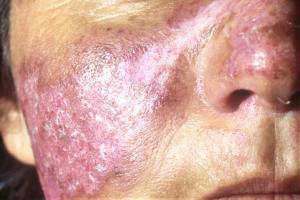Lupus
Systemic lupus erythematosus (SLE) – lupus – is a long-term condition. It causes inflammation to the joints, skin and other organs. There's no cure, but symptoms can improve if treatment begins early.
When to see a GP
You should see your GP if you often get:
- joint pain and stiffness
- extreme tiredness that won't go away no matter how much you rest
- skin rashes – often over the nose and cheeks

As well as the three main symptoms, you might also have:
- weight loss
- swollen glands
- sensitivity to light (causing rashes on uncovered skin)
- poor circulation in fingers and toes (Raynaud's)
Lupus is better managed if diagnosed and treated early.
How lupus is diagnosed
As lupus symptoms can be similar to lots of other conditions, it can take some time to diagnose.
Your GP will usually do some blood tests.
High levels of a type of antibody, along with typical symptoms, mean lupus is likely.
You might be referred for X-rays and scans of your heart, kidney and other organs if your doctor thinks they might be affected.
Once lupus is diagnosed, you'll be advised to have regular checks and tests – for example, regular blood tests to check for anaemia and urine tests to check for kidney problems, which lupus can cause.
Lupus can range from mild to severe
The symptoms of lupus can range from mild to severe.
- mild – this can lead to joint, skin problems and tiredness
- moderate – this can lead to inflammation of other parts of the skin and body, including your lungs, heart and kidneys
- severe – this can lead to inflammation causing severe damage to the heart, lungs, brain or kidneys - can be life-threatening
Treatment for lupus
There's no cure for lupus. But the condition is, most often, treatable and usually responds well to a number of different types of drugs, especially when treatment is started in the early stages of the disease.
The drugs used to treat lupus will depend on the severity of your disease and which parts of your body are affected.
Your treatment will probably be changed or adjusted as your symptoms flare-up or improve. You can discuss treatment options with your doctor.
Versus Arthritis has more information on the treatments for lupus.
Flare ups
Often the disease flares up (relapses) and symptoms become worse for a few weeks, sometimes longer.
Symptoms then settle down (remission). The reason why symptoms flare up or settle down is not yet known.
Some people don't notice any difference and symptoms are constant.
Living with lupus – things you can do yourself
Although medicines are important in controlling lupus, you can help manage your symptoms and reduce the risk of it getting worse.
Things you can do to help manage your symptoms include:
- eating a healthy, balanced diet
- staying active when you're having a flare-up – try walking or swimming
- getting lots of rest
- relaxation techniques to manage stress – stress can make symptoms worse
- using high-factor (50+) sunscreen – you can get it on prescription if you have lupus
- telling your employer about your condition – you might be able to adjust your working pattern
- asking for help from family, friends and health professionals
- stopping smoking – this is the one of the most important things to do if you have lupus
- not sitting in direct sunlight or spending a lot of time in rooms with fluorescent lights
LUPUS UK has advice and information for people with the disease.
Causes of lupus
Lupus is an autoimmune disease. This means the body's natural defence system (immune system) attacks healthy tissues.
It isn't contagious.
It's not fully understood what causes lupus. A viral infection, strong medication, sunlight, puberty, childbirth and the menopause can all trigger the condition.
More women than men get lupus, and it's more common in black and Asian women.
Pregnancy and lupus
Lupus can cause complications in pregnancy.
See your doctor before trying to get pregnant to discuss the risks and so your medication can be changed if necessary.
More useful links
The information on this page has been adapted from original content from the NHS website.
For further information see terms and conditions.